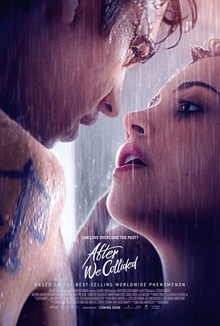“After We Collided” glamorizes toxic relationships to young audiences

Wikipedia
“After We Collided” portrays a toxic relationship with no form of a resolution to young audiences.
December 8, 2020
“After We Collided,” the second movie of the Harry Styles fanfiction series written by Anna Todd, was released on Oct. 23, 2020. The series originated from Wattpad, a free website where anyone can publish written works. Todd’s works gained so much popularity (with over 517 million reads on “After 2”) that the series was adapted into movies by Wattpad Productions.
The series follows the story of Tessa Young and Hardin Scott, who, in the first movie, fell in love with each other despite their differences. Through their ups and downs, the couple navigates their familial issues, work life, and, ultimately, the love they have for each other. Though a seemingly innocent and harmless storyline at first, the series actually follows a trend of toxicity throughout the relationship that is never resolved, and therefore encourages young audiences to normalize the sort of behavior that Tessa and Hardin display.
With the iMovie-esque music that opened the film, it was clear the movie would take a turn for the worse. This incohesiveness between the background music and the scenes that it matched was apparent throughout the entire film, as the music that was introduced was not only sudden, but also did not match the vibe of the scene. And while the music didn’t offer for a smooth transition between emotions, neither did the scenes themselves. Though the quick back-and-forth playback between wild Tessa at the loud club versus collected Hardin at the casual college party would make for an interesting contrast, the execution, which was poorly timed, left us nothing but confused as to why the cuts were so rough.
On the point of execution, not only was there an issue regarding cuts, but also the actors themselves. Hero Fiennes Tiffin, who plays Hardin Scott, delivers his lines in an extremely awkward manner, despite being the protagonist of the film. On top of that, the script of the whole movie is unnatural, cliché, and unnecessarily dramatic. This makes the whole movie feel so scripted that it barely qualifies as a piece of realistic fiction.
And while we could set aside the technological aspects of the movie that made it difficult to watch, the most worrisome aspect of the film was with regards to the toxic relationship it glamorized, especially given that it is geared towards a younger audience. When the first movie ended with Hardin admitting he had only shown an interest in Tessa as a bet, but later developed real feelings, Tessa broke up with him. In the sequel, Tessa ends up forgiving him, but the movie fails to reveal her reason to forgive him, nor any sign of Hardin showing that he has changed and become better for her. This pattern repeats again and again. Whether it be Tessa kissing another man while drunk, or Hardin unable to control his deep-rooted anger issues, the two never seem to have a genuine conversation about their feelings nor how toxic the relationship was becoming for them.
While some of those arguments were necessary to drive the plot forward, most were unresolved with no effort to address the problem and to compromise with a solution. It leaves the young audience with the message that instead of engaging in meaningful conversation with a significant other, they just need to simply tolerate this sort of behavior from their partner in a relationship despite how stressful and painful it can be, which will “fix” everything for the better. Instead of highlighting the importance of communication and how necessary it is to end such relationships when it gets to that point, it glamorizes how damaging and painful toxic love is with a conventionally attractive cast and some cheesy romantic one-liners. I mean, Hardin literally flies to London to “sort things out” with Tessa (sort things out as in fly as far away from her as possible), only to fly back a whole nine days later and get a tattoo symbolizing her on his back. The narrative seems to revolve around the fact that time heals everything, so there doesn’t need to be any effort put into the relationship to make it healthier. How much more privileged, naive, angsty-teen can you get?
Aside from all the negative reviews we can give on the actors, production, and really the whole plot of the movie, there was one thing that we found absolutely unforgivable: Tessa’s full-golden outfit that she wore to the club. While her friends praised the outfit as “gorgeous,” we would say the exact opposite: it was hideous. With a shiny, metallic, gold fabric that is cut at an awkward length and the style of a badly fitted wrap dress, the bright golden ankle-cut boots of the exact same shade just seemed to top the ridiculous outfit off. Tessa’s outfits throughout the movie are extremely questionable as she dresses like a middle aged woman working a nine-to-five job with two children rather than a college student who is in love. The stylists for this movie should have better educated themselves on the current trends in fashion for women Tessa’s age, which would lend her character to be that much more relatable.
With incohesive background music, random scene changes, unnatural acting, an extremely harmful message, and on top of it all, a pair of bright golden ankle-cut boots, “After We Collided” is as immature of a production as the characters it portrays. We can only hope that the sequel, “After We Fell,” can improve. Based on the title itself, our hopes aren’t very high.


